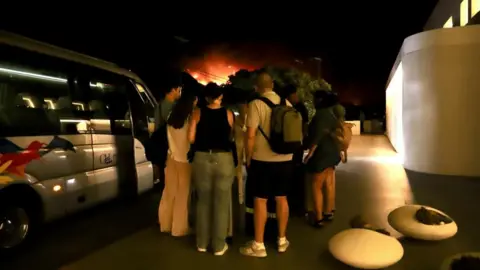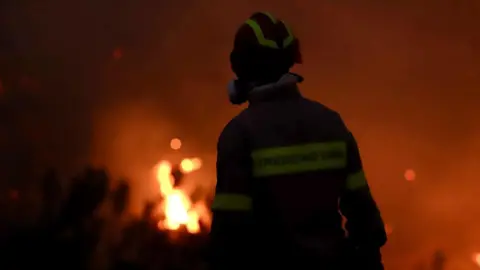Mass evacuations as wildfire rages in Greek island of Crete
Hundreds of people have been evacuated as a major wildfire continues to burn out of control on the Greek island of Crete.
The fire, which has been fanned by gale-force winds, broke out on Wednesday afternoon in rugged forested terrain near the municipality of Ierapetra.
The flames have spread rapidly, threatening homes, tourist accommodation, and critical infrastructure, including a fuel station.
The fire front now extends over at least 6km, according to emergency services, making containment increasingly difficult. Thick smoke has engulfed the wider area, reducing visibility to near zero in places.
 EPA
EPAAuthorities have also ordered the mass evacuation of hotels, rental rooms and homes in the Ferma municipality, as the flames approach the area. The operation is underway with the support of the fire service, police and local volunteers.
So far, approximately 1,500 people have been evacuated from surrounding settlements and tourist areas and moved to Ierapetra. Around 200 evacuees are being sheltered in the town's indoor sports arena.
Smoke from the fire has stretched as far as Makry Gialos beach, 10km (6 miles) from Achlia in Lasithi where firefighters were battling the blaze.
The main road near the settlement of Agia Fotia has been closed by police, who have urged residents and visitors to avoid all non-essential travel due to hazardous air quality, extreme heat, and falling ash.
In the settlement of Agia Fotia, homes and rental properties have been destroyed, and the area is experiencing a power outage, according to local reports. At least four elderly people have been taken to hospital with respiratory problems caused by smoke inhalation.
As a precaution, all hospitals in Crete have been placed on alert by health authorities.
 EPA
EPAThe firefighting response has been significantly reinforced. As of Wednesday night, 155 firefighters, eight specialised foot teams, and 38 fire engines are operating on the ground. Four helicopters carried out water drops until nightfall. Local municipalities have also deployed water tankers and heavy machinery.
Additional forces are en route. Seventeen firefighters and one foot team from the 1st EMODE (Special Forest Firefighting Unit) are travelling by ferry from Piraeus, along with five fire engines, while 33 firefighters and four additional EMODE teams are due to arrive by air from Elefsina.
According to public broadcaster ERT, the fire service has ordered a tactical withdrawal from the fire front to protect personnel and prioritise the creation of firebreaks around at-risk settlements. Crews are expected to remain on the ground throughout the night.
Emergency alerts via the 112 public warning system were issued throughout the day, calling for evacuations from Achlia, Ferma, Agia Fotia, Galini, and later Koutsounari, instructing residents and tourists to move towards Ierapetra.
Some individuals who were cut off by road were reportedly evacuated by boat from local beaches.
The fire, believed to have started between Agia Fotia and the village of Skinokapsala, continues to burn through dense, highly flammable forest, with steep terrain, dry conditions and strong winds making containment extremely difficult.
Earlier this week in Turkey more than 50,000 people were evacuated due to wildfires in the western province of Izmir.
At least six heat-related deaths have been reported in Europe as the continent reels under an early summer heatwave. The latest recorded fatalities were in Spain and Italy. There were also casualties in France.

Sign up for our Future Earth newsletter to keep up with the latest climate and environment stories with the BBC's Justin Rowlatt. Outside the UK? Sign up to our international newsletter here.
